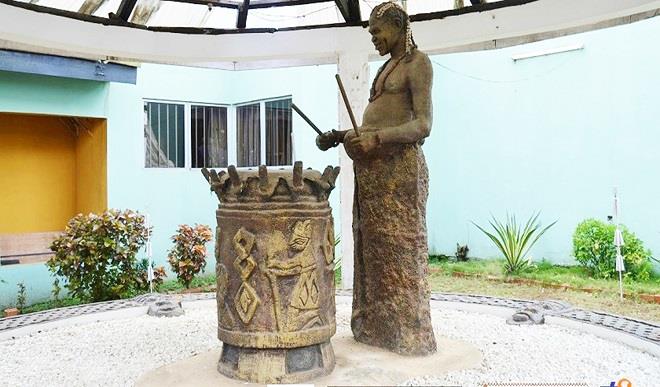
Nigeria’s theatre legend, Dr Hubert Adedeji Ogunde died at exactly 5.25a.m. on Wednesday, April 4, 1990 at the Crowell Hospital in London, United Kingdom. He was aged 74. The Ogunde living history museum, located at Ogunde Quarters in his hometown, Ososa, Ogun State, was established to preserve the artistic legacy of the late theatre practitioner and film maker. The museum, a private initiative by the family of the legend, was officially opened to the public a year ago, that is, on the 25th anniversary of Ogunde’s death.
An excursion to the museum showed that it is filled with a rich collection of indigenous artworks. Important sites at the museum include the room that the late Ogunde slept in the last ten years of his life, his prayer room and final resting place (grave).
The museum also houses all his personal effects, Sango dancing kits, costumes used in his films such as ‘Yoruba Ronu’ and ‘Agbekoya’, vehicles used during his nationwide tours, the aircraft engine used to create a thundering wind effect in the films – ‘Aropin N’tenia’ and ‘Ayanmo’, and many other equipment used in his films.
The museum is also home to all Ogunde’s musical records and recorded music, documents showing his family tree and biography, as well as scenes from his films, including ‘Aiye’ and ‘Jaiyesimi’.
Curator of the museum, Mr Leke Ogunde, grandson of the late legend, told our reporter that a few tourists have been coming to the museum to have a glimpse of the indigenous artifacts there.
He said: “Some tourists have been coming here, including students. I have also been going to different schools to inform them about the museum. I wish more people will visit this museum to see the richness of Nigerian, especially Yoruba culture and art.”
He also noted that the Ogunde family did not receive any financial assistance from government while setting up the museum. “We didn’t get a kobo from the government. The whole thing here was done by our family. It took us many years and a lot of money to set up. We approached the Ogun State government, but up till now, we have not received any support from them. We are looking forward to partner with the government, either the state or federal government,” he said.
As his biography conspicuously placed at the museum read, late Dr. Ogunde was a folklorist, actor, playwright, musician, dramatist, theatre manager, policeman, teacher, human right activist and nationalist of repute. He was born into the family of Mr. Jeremiah Dehinbo Ogunde and Mrs. Eunice Owotunsan Ogunde on Monday, July 10, 1916 at Ososa.
At the age of nine, young Ogunde gained admission into Saint John’s Primary School, Ososa for his elementary education and left the school in 1928 for Saint Peter’s School, Faji, Lagos where he was until 1930. Between 1931 and 1932, he was at Wasimi African School, Ijebu-Ode. His graduation from Wasimi African School actually marked the end of his entire formal education.
Between 1933 and 1941, young Ogunde was a teacher at Saint John’s Primary School, Ososa where he taught in the elementary classes. He later organised his first band as a teacher at Oke-Ona United School, Abeokuta. It was during this period that he developed special skills for opera and folklore, which in later life launched him to becoming arguably the greatest Nigerian folklorist of all time.
It was during holiday in Ibadan that he joined the Nigeria Police Force in December, 1941. He was later transferred on training to the Police Training School, Enugu which later led to his appointment as a Third Class Police Constable. He was later transferred to the Nigeria Police Force ‘C’ Division, Ebute-Meta, Lagos.
In March, 1945, Ogunde resigned from the Force in order to pay full attention to his passion –acting. His resignation was spurred by reckless and gross misconduct of the colonial regime, which was demonstrated by Ogunde in his much talked- about 1945 opera entitled ‘Worse Than Crime’. The opera was a political satire on the colonial masters which set to establish that ‘Colonialism in any shape or form is worse than crime’. This earned Ogunde and Mr. G.B. Kuyinu (his co-director) two days in the police custody.The opera was staged at Glover Hall and Late Dr. Nnamdi Azikiwe chaired the show.
However, Ogunde’s altruism also pushed him to produce an opera ‘Strike and Hunger’ in 1945. The opera was topical. It narrated the events leading to the famous general strike by trade unions for better wages, cost-of-living allowances and improved conditions of service. The strike began in late June 1945 and lasted for 44 days. This play shot Ogunde into national prominence. In all, Ogunde wrote over 60 plays/opera, produced four films and 99 songs.
In 1983, Ogunde was awarded the Order of the Federal Republic of Nigeria (OFR) by the federal government under Alhaji Shehu Shagari. He, however, rejected the honour arguing that corruption was endemic in the land.
In 1985, Ogunde was awarded Honorary Degree of Doctor of Literature by the Obafemi Awolowo University, Ile-Ife and Honorary Degree of Doctor of Letters by the University of Lagos on Friday, January 17, 1986. In 1988, the Ogun State government awarded him the Excellence Award in the Field of Drama and Film Production which he also accepted.
The Ogunde living history museum, set up in memory of the late ‘father of Nigerian drama’, operates from Tuesday to Friday on weekdays and Saturday to Sunday on weekends, including public holidays.
According to the curator, Leke Ogunde, “The museum is a lifetime thing. We really need the government to assist in making it one of the best museums in Africa and the world. We want it to be a museum where tourists can visit and have value for their money.”

 Join Daily Trust WhatsApp Community For Quick Access To News and Happenings Around You.
Join Daily Trust WhatsApp Community For Quick Access To News and Happenings Around You.



